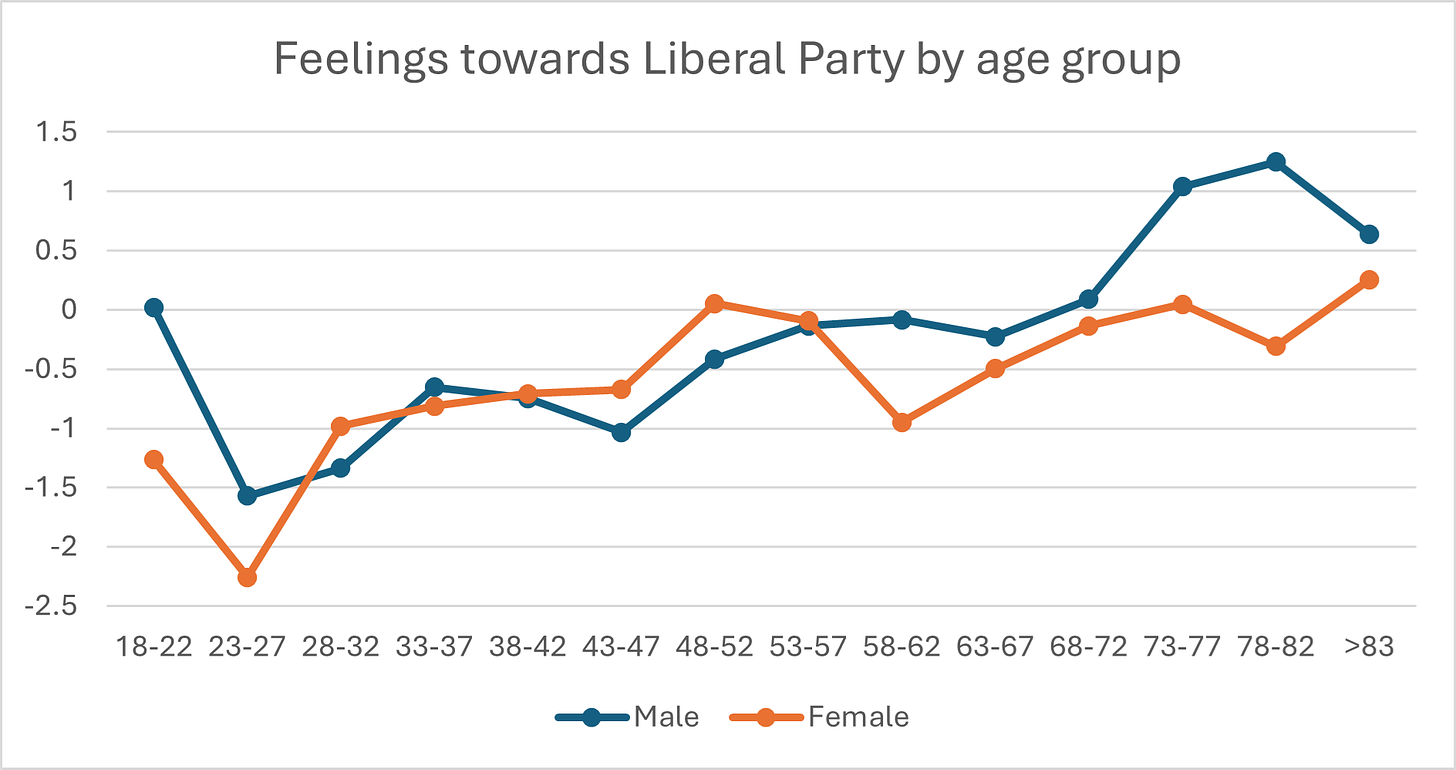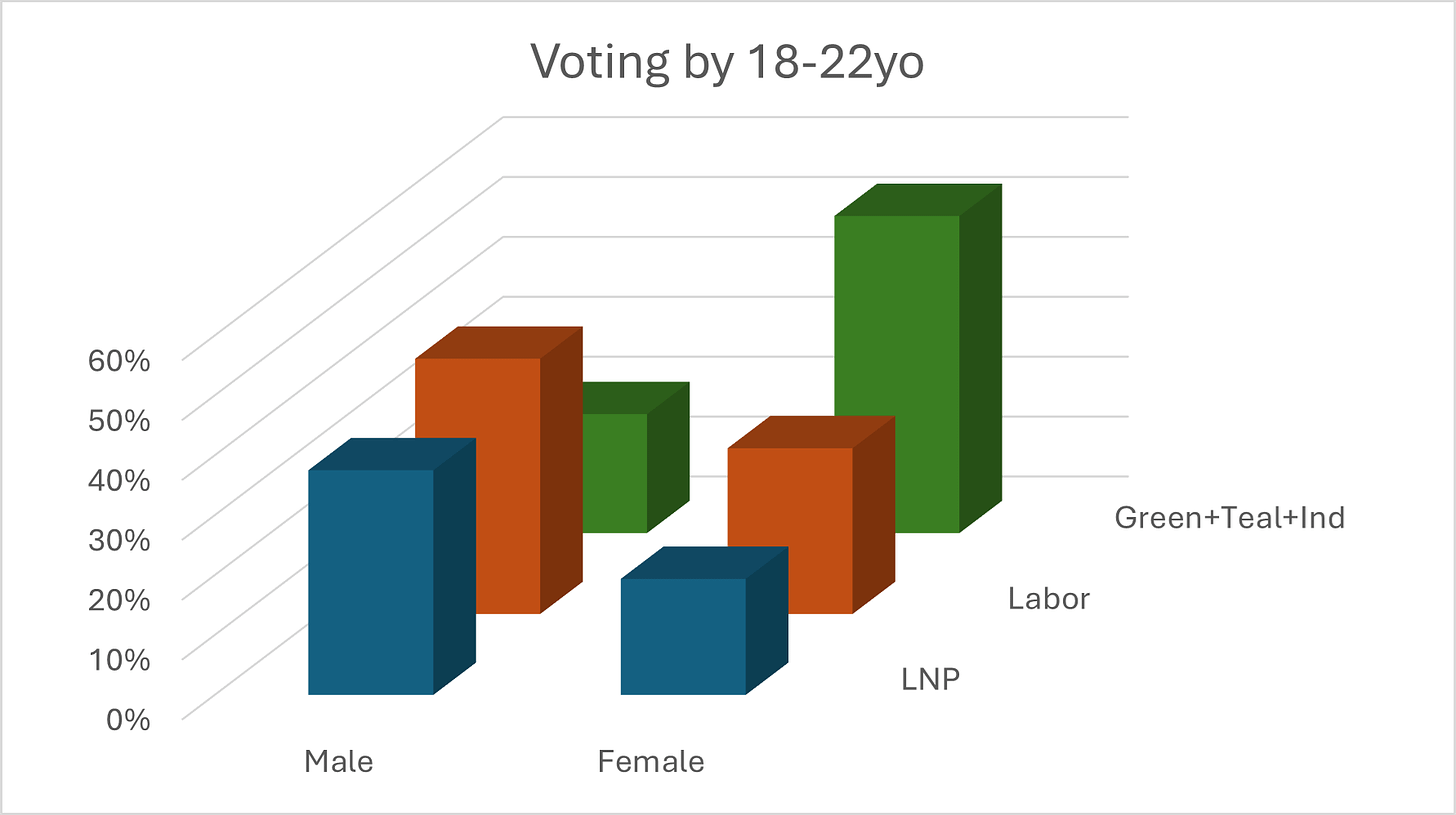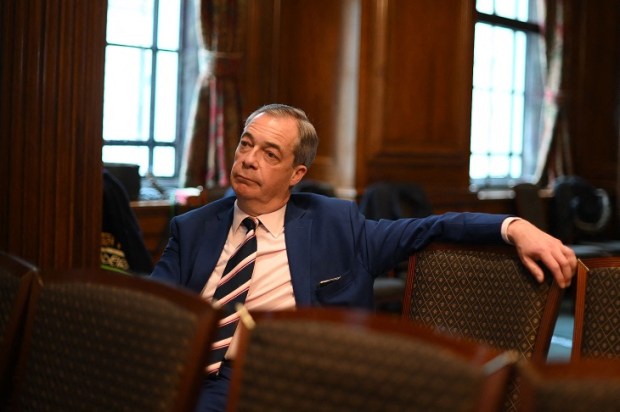Message to the Libs. Don’t turn off the young men – they are your best hope of regaining power.
There’s good reason for Federal Liberal party strategists to be concerned about their future. Times look bleak for conservative parties, with growing evidence that successive generations are moving further left – both in Australia and overseas. Forecasts include ‘a 35-seat reduction in Coalition seats in the House of Representatives by 2040’ according to a Centre for Independent Studies report on young people deserting the right.
However, recent evidence reveals an interesting, more complex trend. In January, a Financial Times article pointed to evidence that while the young women of Gen Z are more left than previous generations, the young men are defying expectations by turning to the centre or even right. Other international surveys have confirmed this trend.
Yet in Australia, a different picture emerges if you look at Australian Election Study data and focus not on the left/right divide but questions about attitude towards the Liberal Party.
That reveals a small glimmer of hope for the Libs. Young men, on the cusp of adulthood, are far more favourable to the Liberal Party than most other age groups – and their political leanings differ strongly from their female cohort.
Our analysis shows young (18-22) men are about equally divided on their attitude towards the Liberal Party – 42 per cent dislike the party to some extent and 39 per cent like it to varying degrees. Such indifference may not seem like cause for celebration, but this group is significantly more positive about the Liberals than almost all the groups of women, and all but men over 65.

And if you look at how these young people actually voted, the Coalition attracted a solid swag of young men while most young women even shunned Labor to support the Greens and Teals.

So, youngsters do offer hope for the Libs. But, as they mature, these young men go off the party. It’s not hard to see why.
There’s plenty of media speculation about ‘gender divergence’ in this young generation. Most suggest it is all about gender politics, with anti-male prejudice and #MeToo radicalising young women and repelling young men. Surveys in Australia, USA and elsewhere show young women becoming more extremist and young men more likely to be hostile to feminism.
There’s plenty of evidence showing young men are being turned off:
- Young men have been more impacted by feminist policies than older cohorts. An American Survey Centre study showed that about half of young men have suffered anti-male discrimination – a sharp increase from just 4 years ago: ‘Increasingly, men are reporting mistreatment in their daily lives.’ In South Korea, nearly 80 per cent of men in their 20s report they are discriminated against.
- In the UK, IPSOS polling show most men under 30 report that feminism’s effect has not been positive.
- A University of Canberra study concluded that ‘younger generations of men view themselves as outsiders’.
In some countries, gender politics is now a mainstream political issue, reflected in their voting patterns. The clearest example is South Korea where young men have pivoted sharply to the right – as reported in The Economist. Similar trends have played out in Argentina, Poland, and Germany.
The result is significant policy changes. Argentina’s new president, Javier Milei, delivered a blistering attack against radical feminism at the World Economic Forum in Switzerland early this year, claiming feminism engenders conflict between men and women. In South Korea, Yoon Suk Yeol vowed to promote tougher penalties for those making false accusations of sexual misconduct. An anti-alienation law has just been passed by the Romanian government, where parental alienation is now included in child protection legislation.
There’s also exciting news from Norway which has released the final report from their Men’s Equality Commission. Here’s one of the Left’s favoured progressive countries announcing a clear rejection of zero-sum thinking – stating that working on behalf of boys and men does not dilute the ideals of gender equality, it applies them. Here’s how the Commission framed the argument: Greater attention to boys’ and men’s equality challenges will strengthen equality policy, not weaken it.
The evidence-based Norwegian report spells out gender gaps in a range of key areas: education, work, health, leisure, crime, family life. And makes strong recommendations, including more men studying for careers in health, education and social care. Plus, gender-neutral equality law – now, how’s that for a radical suggestion?
Not that we’d expect anything radical from the Libs – don’t forget it wasn’t long ago that Liberals were apologising to Brittany Higgins in parliament and voting for Labor’s anti-father family law bill. This leopard isn’t going to radically change its spots.
But perhaps they could come up with a few crumbs for those wavering young men looking for some sign that a future Coalition government won’t continue the divisive gender politics of Labor.
Some reasonable suggestions include:
- An inquiry into barriers to males embarking on teaching careers.
- Measures to address the increasing disengagement of boys at school.
- Introducing blind recruiting into the public service.
- Ensuring equal opportunity in education and employment.
And maybe even the most radical suggestion of all: evidence-based domestic violence policies? Recently Jess Hill, one of the leading feminist domestic violence propagandists, conceded that the advocated primary prevention strategy of promoting respect for women and attempting to ‘reduce gender inequity’ wasn’t working:
‘Telling men and boys that if they make sexist jokes, or fail to challenge the attitudes of their mates, they are personally responsible for the physical and sexual violence or homicides committed by other males has not proven a compelling or successful argument.’
So, all those billions spent on television campaigns and shaming boys in schools has turned out to be a huge mistake. This means our young men have grown up in a culture where successive governments paid for programs that falsely claim they are responsibility for the rape and murder of women. It will take some doing for our major parties to convince such men to ever vote for them again.

























